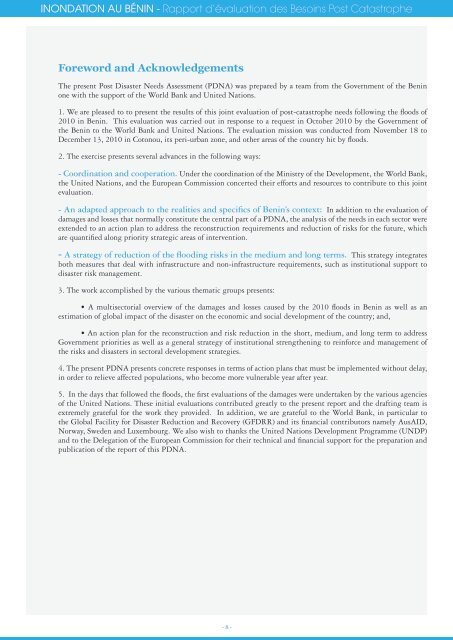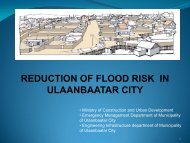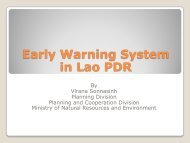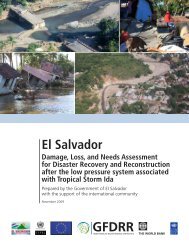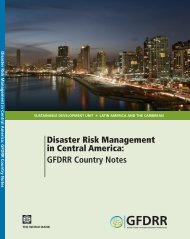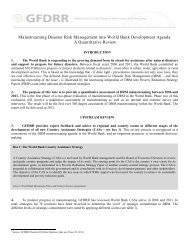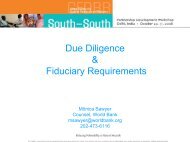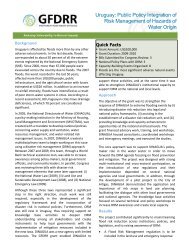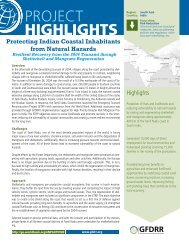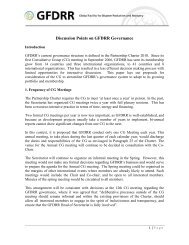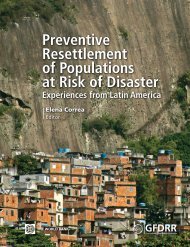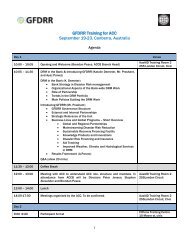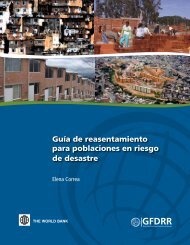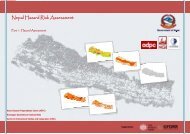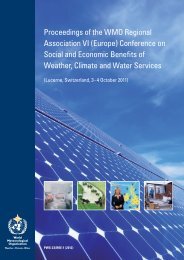INONDATION AU BéNIN - Rapport d'évaluation des ... - GFDRR
INONDATION AU BéNIN - Rapport d'évaluation des ... - GFDRR
INONDATION AU BéNIN - Rapport d'évaluation des ... - GFDRR
Create successful ePaper yourself
Turn your PDF publications into a flip-book with our unique Google optimized e-Paper software.
<strong>INONDATION</strong> <strong>AU</strong> Bénin - <strong>Rapport</strong> d’évaluation <strong>des</strong> Besoins Post Catastrophe<br />
Foreword and Acknowledgements<br />
The present Post Disaster Needs Assessment (PDNA) was prepared by a team from the Government of the Benin<br />
one with the support of the World Bank and United Nations.<br />
1. We are pleased to to present the results of this joint evaluation of post-catastrophe needs following the floods of<br />
2010 in Benin. This evaluation was carried out in response to a request in October 2010 by the Government of<br />
the Benin to the World Bank and United Nations. The evaluation mission was conducted from November 18 to<br />
December 13, 2010 in Cotonou, its peri-urban zone, and other areas of the country hit by floods.<br />
2. The exercise presents several advances in the following ways:<br />
- Coordination and cooperation. Under the coordination of the Ministry of the Development, the World Bank,<br />
the United Nations, and the European Commission concerted their efforts and resources to contribute to this joint<br />
evaluation.<br />
- An adapted approach to the realities and specifics of Benin’s context: In addition to the evaluation of<br />
damages and losses that normally constitute the central part of a PDNA, the analysis of the needs in each sector were<br />
extended to an action plan to address the reconstruction requirements and reduction of risks for the future, which<br />
are quantified along priority strategic areas of intervention.<br />
- A strategy of reduction of the flooding risks in the medium and long terms. This strategy integrates<br />
both measures that deal with infrastructure and non-infrastructure requirements, such as institutional support to<br />
disaster risk management.<br />
3. The work accomplished by the various thematic groups presents:<br />
• A multisectorial overview of the damages and losses caused by the 2010 floods in Benin as well as an<br />
estimation of global impact of the disaster on the economic and social development of the country; and,<br />
• An action plan for the reconstruction and risk reduction in the short, medium, and long term to address<br />
Government priorities as well as a general strategy of institutional strengthening to reinforce and management of<br />
the risks and disasters in sectoral development strategies.<br />
4. The present PDNA presents concrete responses in terms of action plans that must be implemented without delay,<br />
in order to relieve affected populations, who become more vulnerable year after year.<br />
5. In the days that followed the floods, the first evaluations of the damages were undertaken by the various agencies<br />
of the United Nations. These initial evaluations contributed greatly to the present report and the drafting team is<br />
extremely grateful for the work they provided. In addition, we are grateful to the World Bank, in particular to<br />
the Global Facility for Disaster Reduction and Recovery (<strong>GFDRR</strong>) and its financial contributors namely AusAID,<br />
Norway, Sweden and Luxembourg. We also wish to thanks the United Nations Development Programme (UNDP)<br />
and to the Delegation of the European Commission for their technical and financial support for the preparation and<br />
publication of the report of this PDNA.<br />
- 8 -


